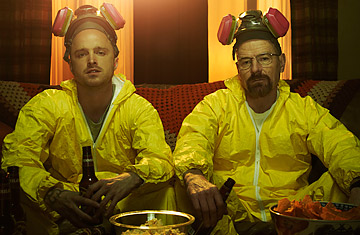
Breaking Bad
When last we saw Walter White on Breaking Bad, his parting words were: "I won." A chemistry teacher turned crystal-meth dealer, Walt (Bryan Cranston) had just killed his drug-lord boss turned nemesis, Gus Fring (Giancarlo Esposito), a crime that involved engineering a murder-suicide, setting off a bomb in a retirement home and poisoning (though not fatally) a child. Walt--who has always told himself he is a decent man, a principled man, a family man--had defeated not only Gus but also his own last remaining scruple.
Now Walt is king: king of the greater Albuquerque, N.M., meth business and of cable drama's Age of the Antihero. The antihero (or, less often, antiheroine) is not a simon-pure good guy or a traditionally, absolutely evil bad guy. He might, like Tony Soprano, be a criminal, but one we see in the mundane context of raising a suburban family. She might be like litigator Patty Hewes of Damages, determined to extract justice for her clients but also ruthless to the point of cruelty. Mad Men's Don Draper is a heel and a fraud but a suave, charming one with a secret past of suffering. Dexter is a serial killer, but he has a code. Sons of Anarchy's Jax Teller gives us Hamlet as a biker-gang prince.
These brooding, scowling, self-destructive characters have produced some of the past decade's best TV. They've also done it so often, in such similarly brooding, scowling, self-destructive ways, that what was once a reaction to TV's formulaic good guys and bad guys is in danger of becoming a formula itself.
Walt, as suits a chemist, is that formula's purest, most crystalline distillation. He's not just a criminal who's like us-- the dues-paying, tube-watching civilian audience--he was one of us, punching the clock and moonlighting at a car wash until a cancer diagnosis pushed him to turn to crime to earn a nest egg for his family. Now, with Walt's cancer in remission and Gus dead, Walt could walk away from the meth business. Or could he? Could he live without power, fear and respect? Does he know how to be a good man anymore?
The title of Breaking Bad--now entering its fifth and final season, whose first half begins July 15 on AMC--is a slang term for the process of turning criminal, as creator Vince Gilligan has explained. It's a telling choice of phrase, describing evil not as an immutable character trait but as a turn from one side to another, a drift across the yellow line on a late-night drive. Breaking Bad shows that every sin Walt commits as a drug dealer grew out of something that was in him before he cooked his first batch of crystal. His vanity--he was a star graduate student and chemist before his career went sour--told him he was entitled to success. His contempt for life's losers let him excuse cooking poison for addicts. And his febrile love for his family let him rationalize any harm he did to anyone else. "We do what we do for good reasons," he tells his guilt-stricken wife Skyler (Anna Gunn) in the new season. Walt's goodness is real, but it is narrow.
